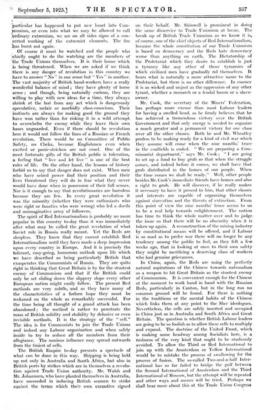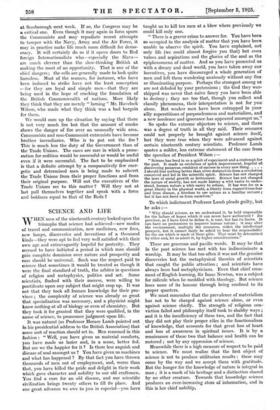THE REDS
THE extremist movements of Labour are like a heath fire. The fire seems to be extinguished and the fire beaters are ready to put on their coats and go home when some favouring breeze fans up smouldering embers and the fire starts off again. Since the War the vicissitudes of industrial agitation have followed almost exactly the course of a heath fire. The short period of calm after the War during which men were waiting to see if a New Jerusalem would really be built in England's green and pleasant land was succeeded by a really dangerous-looking movement when it seemed possible that Labour might try to organize itself on the Russian model and start soviets destined to expand eventually into instruments of domination. - This move- ment died away, thanks to the extraordinarily effective though unconscious propaganda which was supplied by Russia herself. The more British handworkers learnt about what was happening in Russia the less they liked the look of it. Soon Bolshevism became a word of derision. It is impossible to follow all the ups and downs which are within common memory, and we may pass to - the tremendous victory for Conservatism. 'at the last General Election. Anybody might have been excused at that moment for believing that British Labour had put revolutionary ideas behind it for at least a generation. It is true that Labour polled five million votes more than at the previous election, but very few of those votes were cast in the hope of introducing Corn- munism into this country. Yet now, when nothing in Particular has happened to put new heart into Corn- nunism, or even into what we may be allowed to call Ordinary extremism, we see on all sides signs of a con- , eerted working of the extremist elements. The fire has burst out again: Of course it must be watched and the people who ;chiefly ought to do the watching are the members of the Trade Unions themselves. It is their house which is being threatened. When we are asked if we think there is any danger of revolution in this country we have to answer "No " in one sense but " Yes " in another. The vast majority of British hand-workers have a really :wonderful balance of mind ; they have plenty of horse sense ; and though, being naturally curious, they are willing to play with new ideas for a time, they always shrink at the last from any act which is dangerously speculative, unfair or morbidly class-conscious. Their instincts are always for making good the ground they have won rather than for risking it in a wild attempt to overwhelm the- enemy while they leave their own bases unguarded. Even if there should be revolution here it would not follow the lines of a Russian or French revolution. There would be no Committee of Public Safety, no Cheka, because Englishmen even when excited or panic-stricken are not cruel. One of the most fortunate gifts of the British public is toleration, a feeling that " live and let live " is one of the best rules of life. On the other hand, the lessons of history 'forbid us to say that danger does not exist. When men who have seized power find their position and their lives threatened they will do in fear what they never Would have done when in possession of their full senses. Nor is it enough to say that revolutionaries are harmless because they are • few. In every great revolution it was the minority (whether they were enthusiasts who were- right 'or fanatics who were wrong) who led a docile and unimaginative army of followers.
The spirit of Red Internationalism is probably no more popular in this country to-day than it was immediately after what may be called the great revelation of what Soviet rule in Russia really meant. Yet the Reds are sleepless. They know that they cannot establish Red Internationalism until they have made a deep impression upon every country in Europe. And it is precisely the tolerant, easy-going, humorous outlook upon life which we have described as being particularly British that exasperates the Conununists of Russia. They are quite right in thinking that Great Britain is by far the stoutest enemy of Communism and that if the British could only be set sliding down the slippery slope every other European nation might easily follow. The present Red methods are very subtle, and as they have many of the.. characteristics of a forlorn hope they must be reckoned on the whole as remarkably successful. For the time being all thought of a grand attack has been abandoned ; the method is rather to penetrate the mass of. British solidity and stolidity by delusive or even invisible methods. It is the strategy of the " cell." The idea is for Communists to join the Trade Unions and indeed any Labour organization and when safely inside to try to seduce all the members from their allegiance. The noxious influence may spread outwards from the tiniest of cells.
The British Empire to-day presents a spectacle of what can be done in this way. Shipping is being held up not only in Australia and South Africa, but also in British ports by strikes which are in themselves a revolu- tion against Trade Union authority. Mr. Walsh and Mr. Johannsen, who have planted themselves in Australia, have succeeded in inducing British seamen to strike against the terms which their. own executive signed on their behalf. Mr. Shinwell is prominent in doing the same disservice to Trade Unionism at home. The break up of British Trade Unionism as we know it is, of course, one of the chief objects of Red Internationalism, because the whole constitution of our Trade Unionism is based on democracy and the Reds hate democracy worse than anything on earth. The Dictatorship of the Proletariat which they desire to establish is just a tyranny like any other of those tyrannies of which civilized men have gradually rid themselves. It bears what is naturally a more attractive name to the Proletariat, but there is no other difference. In essence it is as wicked and unjust as the oppression of any other tyrant, whether a monarch or a feudal baron or a slave- owner. .
Mr. Cook, the secretary of the Miners' Federation, has perhaps more excuse than most Labour leaders for having a swelled head, as he firmly believes that he has achieved a tremendous victory over the British Government and that only energy is needed to organize a much greater and a permanent victory for one class over all the other classes. Both he and Mr. Wheatley profess to be making ready for a kind of civil war which they assume will come when the nine months' truce in the coalfields is ended. " We are preparing a Com- missariat department," says Mr. Cook ; " I am going to set up a fund to buy grub so that when the struggle comes, and indeed before it comes, we shall have that grub distributed in the homes of our people. When the time comes we shall be ready." Well, other people besides Mr. Cook's immediate friends have homes and also a right to grub. He will discover, if he really makes it necessary to have it proved to him, that other classes and interests are capable of organizing themselves against starvation and the threats of extinction. From this point of view the nine months' truce seems to us to be a real help towards enlightenment. The nation• has time to think the whole matter over and to judge- the issue so that there will be no obscurity when it is taken up again. A reconstruction of the mining industry by constitutional means will be offered, and if Labour is so mad as to prefer war there will no longer be any tendency among the public to feel, as they felt a few weeks ago, that in looking at once to their own safety they might be sacrificing a deserving class of workers who had genuine grievances.
In China, again, the Reds are using the perfectly natural aspirations of the Chinese towards nationalism as a weapon to hit Great Britain as the stoutest enemy of Communism. It is convenient enough for the Chinese at the moment to work hand in hand with the Russian Reds, particularly in Canton, but in the long run no common ground will be found. For there is nothing in the traditions or the mental habits of the Chinese which links them at any point to the Slav ideologues. Nevertheless, the cells are safely inserted and occupied in China just as in Australia and South Africa and Great Britain. The question is whether British Labour leaders are going. to be so foolish as to allow these cells to multiply and expand. The doctrine of the United Front, which is making some headway among Socialists here, is a rashness of the very kind that ought to be studiously avoided. To allow the Third or Red International to join up with the Amsterdam or Yellow International would be to mistake the process of swallowing for the process of fusion. The so-called Two-and-a-half Inter- national has so far failed to bridge the gulf between the Second International of Amsterdam and the Third International of Moscow, but the attempt will be repeated and other ways and means will be tried. Perhaps we shall hear more about this at the Trade Union Congress at Scarborough next week. If so, the Congress may be a critical one. Even though it may again in form spurn the Communists and may repudiate recent attempts to tamper with the Navy, Army and the Air Force, it may in practice make life much more difficult for demo- cracy. It will certainly do so if it opens doors to Red foreign Internationalists who—especially the Slays— are much cleverer than the slow-thinking British at making the most of an opportunity. That is one of the chief dangers ; the cells are generally made to look quite harmless. Most of the seamen, for instance, who have been induced to strike have not the least conception —for they are loyal and simple men—that they are being used in the hope of cracking the foundation of the British Commonwealth of nations. More likely they think that they are merely " laming " Mr. Havelock Wilson, who made what they think was a bad bargain for them.
We would sum up the situation by saying that there is not very much fire but that the amount of smoke shows the danger of fire over an unusually wide area. Communists and non-Communist extremists have become brother incendiaries. Who is to put out the fire ? This is much less the duty of the Government than of the Trade Unions. The cases are rare in which a prose- cution for sedition would be successful or would be useful even if it were successful. The fact to be emphasized is that a definite attempt by a comparatively few ener- getic and determined men is being made to subvert the Trade Unions from their proper functions and from their original purpose. Will not the executives of the Trade Unions see to this matter ? Will they not at last pull themselves together and speak with a force and boldness equal to that of the Reds ?












































 Previous page
Previous page